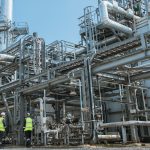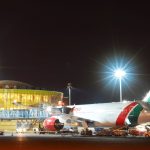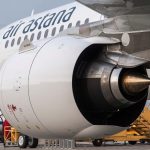The European Commission has released details of its long-awaited Sustainable Transport Investment Plan (STIP) to help accelerate funding and production of renewable and low-carbon aviation and maritime fuels. Conceding that Europe faces “clear market failure” unless it can quickly attract investments in new fuel development, the Commission has announced initiatives including streamlined funding procedures, designed to collectively mobilise at least €2.9 billion ($3.4bn) to progress programmes by the end of 2027. By 2035, it added, 20 million tonnes of alternative fuels – 13.2 Mt of biofuels and 6.8 Mt of synthetic product, or e-fuels – will be needed to meet targets set under the ReFuelEU Aviation programme and FuelEU Maritime Regulations, requiring an estimated €100 billion ($116bn) in investments to drive production. A key focus of the package is to support production of e-fuels, a pathway considered critical to decarbonising air and sea transport, but with no European projects yet achieving final investment decision.
“The Investment Plan responds to the urgent need to unlock investment and scale up production of renewable and low carbon fuels,” said the Commission, which is targeting a 90% reduction in aviation and maritime emissions by 2050.
As part of its decarbonisation ambition, the Commission expects sustainable aviation fuel to comprise 20% of aircraft fuel supplies at EU airports by 2035, which it estimates will require investments of between €57 billion and €67 billion.
“STIP brings together targeted measures to boost investment in renewable and low-carbon fuels across Europe, both in the short and long term,” explained the Commission.
“A key component of the EU Competitiveness Compass and the Clean Industrial Deal, this initiative provides for the first time a common approach to boost investments into renewable and low-carbon fuels for these (aviation and maritime) sectors.
“The EU measures under this plan are expected to mobilise at least €2.9 billion by the end of the current Multiannual Financial Framework (MFF) period in 2027.”
The STIP programme features multiple initiatives through various EU channels to help expedite investment in, and production of, the new fuels.
To quickly remove key investment barriers and bridge the financial gap between conventional and low-or-no carbon product, InvestEU plans to mobilise at least €2 billion for sustainable aviation and shipping fuels until 2027.
Next month, the Commission will also launch a €300 million programme through the European Hydrogen Bank to support production of hydrogen for use in sustainable aviation and maritime fuels, while a further €133 million through Horizon Europe will be used to support research and innovation projects.
As well, the Commission will use the Innovation Fund to mobilise €153 million for synthetic aviation fuel projects and €293 million for maritime fuel projects.
And next year, the Commission will work with interested EU member states to launch an eSAF Early Movers Coalition, designed to generate at least €500 million to finance several large-scale projects through Europe’s first pooled ‘double auction’ pilot programme for trading the new fuel.
Through double auction programmes, market prices are established after multiple suppliers nominate prices at which they are prepared to sell their product, and buyers submit prices they are prepared to pay, with an intermediary mechanism then used to assess the bids and match buyers and sellers, providing both with pricing certainty.
The lack of progress in e-fuel projects is particularly concerning for both the EU, which as part of its SAF blending requirements has set a sub-mandate for e-fuels, starting at 0.7% in 2030 and rising to 35% in 2050, and for the airline industry, which argues that due to feedstock limitations, diverse SAF development pathways are vital to spread production risks and boost fuel supplies to meet decarbonisation targets.
“Despite Europe having the largest project pipeline ready for e-fuel production, investors hesitate to take final investment decisions,” said Apostolos Tzitzikostas, the EU’s Commissioner for Sustainable Transport and Tourism, who warned that unless targets were reached “we face a clear market failure.”
“Sustainable fuels currently cost 2 to 10 times more than conventional fuels and require massive capital investments. There is also a mismatch between the needs of the fuel producers and the needs of off-takers like airlines or shipping companies.
“To scale up the production of renewable and low-carbon fuels, we need €100 billion for investment by 2035, and we need it fast. There is no time to lose.
“Most of this is expected to come from the private sector, but it is not yet happening, and certainly not at the pace required or at the pace we would want. The STIP therefore sends a clear signal to investors: Our targets are stable and the Commission will support the sector throughout the transition.”
In the aviation sector, the STIP announcement drew varied responses.
“We welcome the Commission’s recognition of market challenges that derive from SAF mandates that were flawed from the outset, particularly the price gap between sustainable and conventional fuels, and the need for robust investment support,” said Willie Walsh, Director General of the International Air Transport Association (IATA).
“Extending SAF support under the EU ETS, exploring tradable SAF book-and-claim mechanisms, simplifying operator reporting, improving access to sustainability certificates via the Union Database (UDB), and advancing dual conformance of SAF under EU RED and CORSIA to promote global harmonisation are positive steps, but we need to see how words turn into reality.”
While supportive of e-fuels, IATA expressed concerns about the Commission’s strong focus on eSAF, arguing that a technology-neutral approach which also supports biofuels is essential to maximise the collective potential of all SAF pathways to achieve the target of 500 Mt in 2050.
“It provides some but not all elements of the plan the market needs, but words on paper must be urgently backed up by firm political action to deliver on promises,” added Ourania Georgoutsakou, Managing Director of Airlines for Europe (A4E). “Mandates alone do not create a functioning SAF market, and it is high time we collectively admit that and take action to accelerate affordable SAF.”
Chelsea Baldino, Fuels Programme Lead for The International Council on Clean Transportation (ICCT), and Andy Navarette, ICCT Fuels Researcher, who have jointly conducted detailed research into sustainable aviation fuel economics, said the STIP showed the Commission recognised the need for revenue certainty.
“In the case of SAF specifically,” they observed, “the STIP states that the Commission could extend the SAF allowances mechanism within the EU Emissions Trading Scheme (ETS), which covers a certain percentage of the price gap between SAF and fossil jet fuel.
“While such a measure would reduce the cost of SAF for airlines, ICCT’s research suggests that additional revenue certainty benefiting SAF producers directly would also be key to bringing new production online.”
European sustainable transport lobbyist Transport and Environment (T&E) welcomed the Commission’s acknowledgement of e-fuels as a key decarbonising tool, and the double auction process to generate investment in this pathway.
“The plan clearly acknowledges the important role of e-fuels in decarbonising aviation and shipping,” said Antony Froggatt, T&E’s senior director for aviation, shipping and energy. “For the first time, the EU will develop an effective financial instrument to kickstart production.”
But, he argued, the double-sided auction process should be used only to progress e-fuels, which needed an investment boost, compared to biofuels, production of which was already well-established.
DESTINATION 2050, an alliance of A4E, the airports’ representative body ACI Europe, the European Regions Airline Association (ERA), the Civil Air Navigation Services Organisation (CANSO), and European aerospace sector lobbyist ASD, said potential funding support flagged in the STIP announcement “appears disappointingly low and not commensurate with the scale of investment required”, but welcomed the double-sided auction system as a measure to drive investment while narrowing the cost gap between fossil fuels and SAF.
Laurent Donceel, Director of Transport for Hydrogen Europe, said the STIP programme “rightly identifies that a comprehensive funding approach is necessary to help projects reach final investment decision and sign durable offtake agreements.
“Yet, the price difference between renewable and low-carbon fuels and their fossil competitor remains too high, and more efforts are needed to narrow the gap.”
Editor’s note: The STIP will be discussed in a panel session at Aviation Carbon 2025 that will include representatives from the airline industry, NGOs, SAF and eSAF producers and the European Commission.

Tony Harrington
Correspondent















More News & Features
LanzaJet produces first next generation, ethanol-based SAF at flagship Freedom Pines refinery
News Roundup October 2025
XCF plans three new Australian SAF plants, while Wagner and FlyOro activate blending facility
UK government starts new consultation on SAF revenue certainty mechanism
African Development Bank and Japanese industrialist unite to explore SAF production in Africa
Cirium analysis challenges assumptions between aviation growth and environmental impact